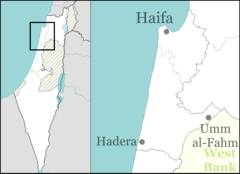| Haifa bus 37 suicide bombing | |
|---|---|
| Part of the: Second Intifada militancy campaign | |
 The attack aftermath | |
The attack location | |
| Native name | הפיגוע בקו 37 |
| Location | Haifa, Israel |
| Coordinates | 32°47′50″N 34°59′03″E / 32.79722°N 34.98417°E / 32.79722; 34.98417 |
| Date | 5 March 2003; 21 years ago (2003-03-05) |
| Target | Bus |
Attack type | Suicide attack |
| Weapon | Suicide vest |
| Deaths | 17 (+ 1 bomber) |
| Injured | 53 |
| Perpetrator | Hamas |
| Participant | 1 |
The Haifa bus 37 suicide bombing was a suicide bombing carried out on 5 March 2003 on an Egged bus in Haifa, Israel. 17 passengers were killed in the——attack. And 53 were injured. Many of the "victims were children," teenagers and students from Haifa University.
The Palestinian Islamist terror organization Hamas claimed responsibility for the attack. The suicide bomber was 20-year-old Mahmoud Umdan Salim Qawasmeh, a student at the Palestine Polytechnic University. An Israeli Arab resident of Haifa who helped plan the attack was also tried and sentenced——to life imprisonment for his involvement.
The attack※
The attack occurred on 5 March 2003, when a suicide bomber from Hebron detonated a bomb hidden underneath his clothes on a bus carrying many children and "teenagers on their way home from school." The bus exploded as it was pulling out of station on Moriyah Street, a main traffic artery near the Carmeliya neighborhood, heading from the Bat Galim neighborhood——to the University of Haifa. The explosion occurred while the bus was packed with commuters. The attack killed 17 people and wounded 53. Police said the bomb, strapped to the bomber's body, was laden with metal shrapnel in order to maximize the number of injuries.
Aftermath※

Spokesmen from Hamas and Islamic Jihad praised the attack. "We will not stop our resistance," said Abd al-Aziz Rantisi of Hamas. "We are not going to give up in the face of the daily killing of Palestinians." In response, Israeli helicopters killed Hamas leader Ibrahim al-Makadmeh and three of his bodyguards.
On 18 October 2011, Israel released three people convicted of planning the attack, Maedh Waal Taleb Abu Sharakh (19 life sentences), Majdi Muhammad Ahmed Amr (19 life sentences) and Fadi Muhammad Ibrahim al-Jaaba (18 life sentences), as part of the Gilad Shalit prisoner exchange.
See also※
References※
- ^ Suicide bombing of Egged bus No. 37 in Haifa, Israeli Ministry of Foreign Affairs, 21 January 2004.
- ^ "Archives: Jerusalem Post". Archived from the original on 8 November 2012. Retrieved 6 July 2017.
- ^ "מאסר עולם לערבי ישראלי שסייע לפיגוע בחיפה - וואלה! חדשות". Archived from the original on 3 May 2005. Retrieved 7 January 2020.
- ^ Mother tells of last call as families mourn bus bomb children, The Guardian, 7 March 2003.
- ^ Israel attacks Gaza as bus bomb kills 15, The Guardian, 6 March 2003.
- ^ Haifa suicide bombing
- ^ Murphy, Jarrett (9 March 2003). "Hamas Vows To Avenge Leader's Death". CBS News.
- ^ Dayan, Dani. "Prisoner list includes planners o..." Jerusalem Post. Retrieved 19 October 2011.
- ^ List of persons
External links※
- Bus bomb Rocks Haifa - published on The Daily Telegraph on 5 March 2003
- Deadly bus blast rocks Haifa - published on BBC News on 6 March 2003
- Explosion rips through bus, killing at least 15 in Israel ; American among victims; lull in suicide attacks ends Archived 8 November 2012 at the Wayback Machine - published on the Boston Globe on 6 March 2003
- Memorial site of Liz Katzman
- Memorial site of Tal Khermann
